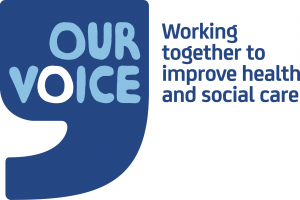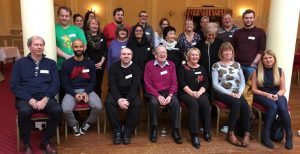Open Government Partnership
The first citizens’ jury held on healthcare in Scotland: a guest blog
February 22, 2019 by Niamh Webster 1 Comment | Category Uncategorized
A guest blog written by Erica Reid, Chair of the Oversight Panel of Our Voice Citizens’ Jury. She shares their experience of trying a new approach to involving people in decision-making. This include her personal reflections on attending a meeting where the primary purpose was to hear the public presenting their views to healthcare professionals for the first time in her career, and the enormous value of this. Read on to find out more about the ‘Our Voice Citizens’ Jury’…
There are times when you know you must be involved with something special. It’s a dark February evening, the location Dundee, the weather wet and cold, so why were forty people meeting here on a cold winter’s night?
It was the report out of the Our Voice Citizens’ Jury: the first Citizens’ Jury to be held on a healthcare topic in Scotland. The room was laid out with the Jury sitting to one side, as in a courtroom, and others attending sitting in the gallery. There was no judge. Those of us who weren’t part of the Jury were there to listen. To listen to the recommendations, to hear how they were reached, and to enter into a dialogue to increase our understanding of the context of these recommendations. Listening with attention and curiosity.

Our Voice logo
The Our Voice Citizens’ Jury is an example of a perfect alignment of two policies. The first is the Chief Medical Officer’s policy on Realistic Medicine and the second is the Our Voice policy framework on improving how we engage and involve people in health and social care. Realistic Medicine has six components and the focus of the Our Voice Citizens’ Jury was on one of these: Shared Decision Making. Our Voice provides guidance for meaningful public involvement to be channelled through three different levels of engagement using a variety of methods. The Our Voice Citizens’ Jury was to consider Shared Decision Making using a deliberative approach at a national level.
The Scottish Health Council led the commission to deliver on this request. Shared Futures delivered the Citizen Jury, with an Oversight Panel convened to ensure rigorous attention to process and outcome. As chair of the Oversight Panel this involved bringing a diverse group together to focus attention on several questions, including:
• How can we match the Scottish population demographically with a Jury of 24 people?
• How will we frame the question?
• How often does the Jury meet to deliberate?
• Who are the commentators?
• How will the Jury bring their recommendations to the Chief Medical Officer?
• What promise do we make around the recommendations?

Our Voice Citizens Jury
There was a lot of energetic debate at the Oversight Panel, all with equal voice, from those who were there as public representatives to doctors and academics in the field of politics. The wording of the question took some time to reach the final version:
‘What should shared decision-making look like and what needs to be done for this to happen?’
Over three days, 24 people representative of the Scottish population, heard from 14 commentators, deliberated and considered the question to come to 13 ranked recommendations.
These recommendations are written in their own words in the report, and I have summarised the top three below:
1. A programme to inform and educate patients on their right to ask questions.
2. Training for all health and social care staff on shared decision making.
3. Provide opportunity for advocates to be present in discussions between patients and medical professionals.
All the recommendations will now be considered by the Realistic Medicine Oversight Group with a commitment to respond to them all within 3 months.
In general conversation some have expressed concern to me about engaging the public in this way. How can they be expected to understand the complexities of our systems and the constraints of our resources? Well, it appears that the ‘public’ in the Jury did understand. It seems that when given time and information the public can come to very informed decisions that can provide a different perspective.
On that cold and dark evening in February, Catherine Calderwood, the Chief Medical Officer, came to listen to the Our Voice Citizens’ Jury deliberations. In my 35 years in the NHS this is the first meeting I have attended when it was the public presenting their views and expertise to the professionals present. It is now our duty to give these our respectful consideration.
Erica Reid is Associate Director of Nursing in NHS Borders. She can be contacted at erica.reid@borders.scot.nhs.uk or via Twitter @esjreid
Further information:
The recommendations of the Our Voice Citizens’ Jury can be found at http://scottishhealthcouncil.org/our_voice/citizens_jury.aspx
Realistic Medicine https://www.gov.scot/binaries/content/documents/govscot/publications/report/2018/04/summary-practising-realistic-medicine/documents/00534350-pdf/00534350-pdf/govscot%3Adocument
Our Voice: working together to improve health and social care
http://scottishhealthcouncil.org/our_voice/our_voice.aspx#.XGlb-M_7QWo
Thanks to Erica for sharing! If you’ve got something you’d like to share or an innovation we should know about, get in touch. We’ll be sharing more guest blogs and spotlights on exciting open government and public involvement examples as often as we can now, so we’re always keen to hear from new people and find out what other exciting work is going on in Scotland. Get in touch at ingage@gov.scot, @scotgovopen or leave a comment below. Thanks.
Tags: citizens jury, healthcare

Can you tell me please how Open Government progress works? Does someone draw to your attention something they think lacks transparency (on any Govt related subject )and you look into it? Or is it, in practice, something different from that?
Glad to hear and with best wishes,
DG Elder